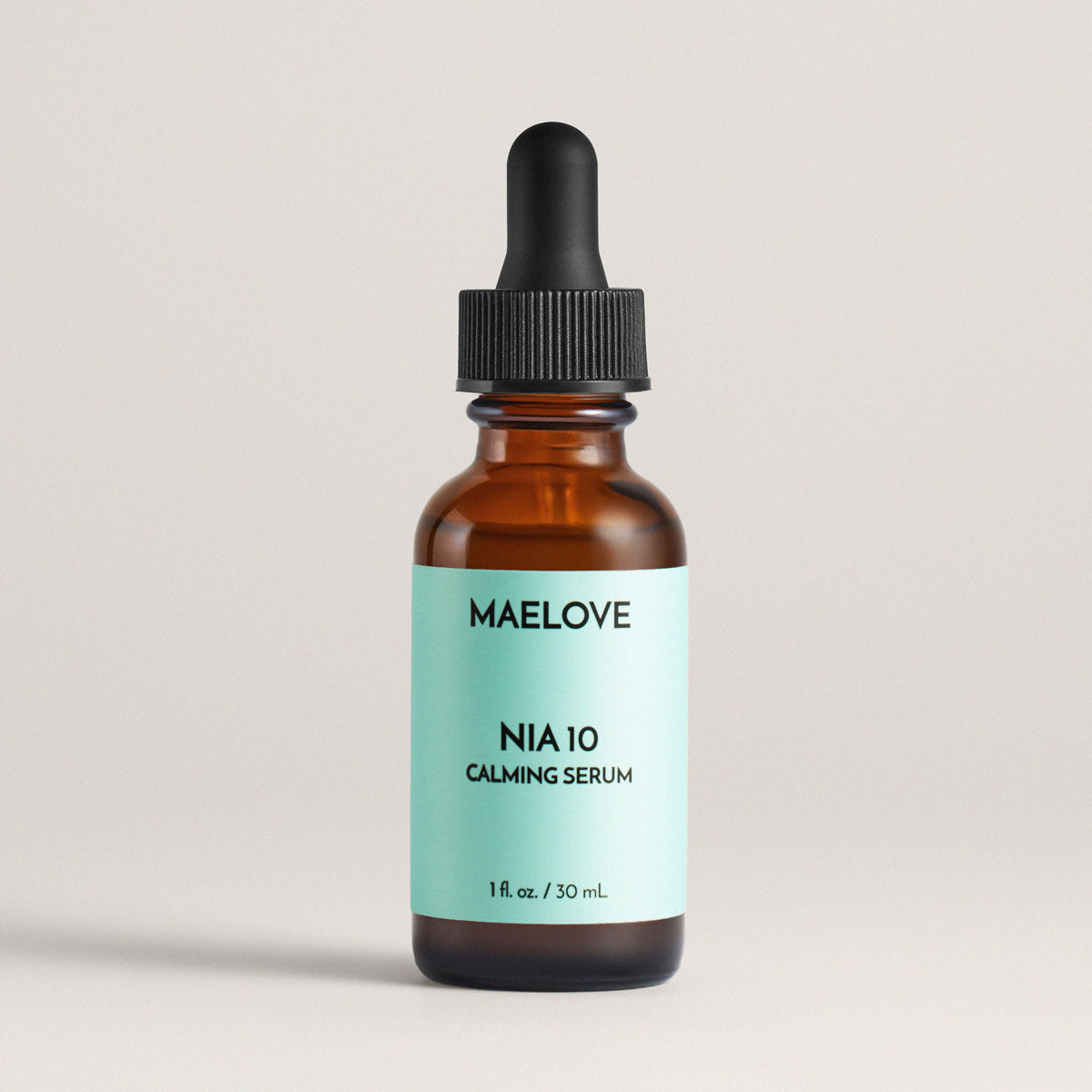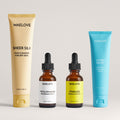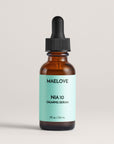

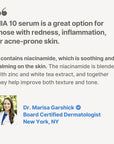
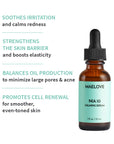
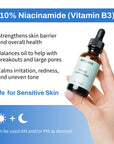
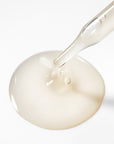
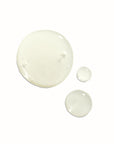
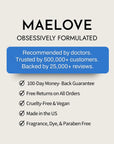
NIA 10 Niacinamide Serum
- Calms redness
- Strengthens the skin barrier
- Niacinamide
Most orders are processed and shipped within two business days (Mon - Fri). You’ll receive an email with tracking details as soon as yours is on its way.
For US-based shoppers, shipping is on us for orders $50 and over. Anything less is a flat $6.95 charge.
100-Day Peace of Mind: Skincare is a journey, and we're with you. You have a full 100 days to try your products. If you aren't satisfied, returns are free and easy through our self-serve portal or a quick note to team@maelove.com
Weeks 1-2: Your skin starts to feel calmer and less reactive. You’ll notice the serum absorbs in about a minute without pilling.
Weeks 2-4: If you use retinoids or strong actives, that "raw" or tight feeling begins to ease. You'll also likely notice oil production starting to balance, helping you stay matte for a few hours longer each day.
Weeks 4 and beyond: This is the results window where redness starts to visibly soften and your skin barrier feels more resilient. It’s the reliable foundation your routine needs to handle high-potency treatments without the drama.
"I tried this product on a recommendation from my dermatologist. I was initially skeptical because I’ve been struggling with worsening rosacea, and even prescription medications had failed.
I've been pleasantly surprised by how much this serum has helped! The redness and dry patches are not completely gone, but I've definitely noticed a significant improvement in my skin over the past month." - Taylor D.


NIACINAMIDE (Vitamin B3)
- Strengthens your skin's protective barrier (so irritants stay out and moisture stays in), regulates the oil production that leads to breakouts and large pores.
- Reduces inflammation that causes chronic redness and rosacea flares.
REDNESS & PORE CONTROL (Zinc PCA, Mushroom Extract, Witch Hazel)
- Natural astringents that tighten pores, control excess oil, and calm inflammation.
- Zinc PCA has antimicrobial properties that help prevent breakouts, while mushroom extract acts as a gentle toner that refines skin texture.
- Together, they address the sebum overproduction that makes skin shiny by noon and pores look enlarged.
IRRITATION INSURANCE (Aloe, White Tea)
- These soothing botanicals calm redness on contact and buffer the 10% niacinamide so you get visible results without the stinging or sensitivity that can come with high-concentration actives.
full ingredient list in FAQ
Use AM and/or PM. Apply a thin layer of serum to the face, neck, and chest. Massage product in until it is fully absorbed. Follow with a gentle moisturizer to lock in the serum.
Layer your products from thinnest to thickest in texture, waiting a full minute between each product.
Some users experience brief tingling or warmth for 30-60 seconds when they first apply it (it's a sign of weakened skin barrier). If the tingling bothers you, it usually diminishes after the first few uses as your skin adapts.




Customer Reviews
For the Curious
All Maelove products are tested for sensitive skin, made in the US, vegan, cruelty-free, non-comedogenic, gluten-free, and free of parabens, phthalates, dyes, and artificial fragrances. We don't use ingredients that are banned in the EU or in the USA.
Aqua (Water), Niacinamide (Vitamin B3), Dimethyl Isosorbide, Caprylyl Glycol, Pentylene Glycol, Zinc PCA, Camellia Sinensis Leaf Extract, Aloe Barbadensis Leaf Juice Powder, Fomes Officinalis Extract, Hamamelis Virginiana Water, Tocopherol (D-alpha), Xanthan Gum, Sodium Gluconate, Ethylhexylglycerin, Butylene Glycol, Phenoxyethanol, Alcohol
Niacinamide (vitamin B3) is one of the great tried and true ingredients that seem to have efficacy across many skin conditions. It is scientifically proven to strengthen the natural skin barrier while also being one of the best anti-inflammatory ingredients. It has proven efficacy against redness (Draelos et al. 2005). Clinical studies on efficacy show 5% niacinamide is more effective than 2%, and 10% maximizes efficacy. At the same time, safety studies show that even for up to 20% concentration solutions, there is little to no irritation on skin in patch tests (Gehring 2004, Draelos et al. 2006).
Those with sensitive skin have a weakened skin barrier that allows for environmental irritants to pass through the barrier. This is why those with sensitive skin are prone to inflammation and skin redness as well as contact dermatitis.
Topical application of niacinamide can strengthen the skin barrier because it can penetrate and upregulate important cofactors NAD and NADP (nicotinamide adenine dinucleotide and nicotinamide adenine dinucleotide phosphate). These cofactors are involved in producing components that make up the skin barrier. Hence, niacinamide can increase production of beneficial proteins (keratin, filaggrin and involucrin) and lipids (ceramides, free fatty acids, and cholesterol) that make up the skin barrier. In clinical studies, Niacinamide has been shown to improve skin barrier function and also increase skin moisture levels in those suffering from rosacea (Draelos et al. 2005) and atopic dermatitis (Soma et al. 2005). Hence, even those with clinically significant impairments in the skin barrier with associated redness can be treated with niacinamide.
To combat inflammation and redness, niacinamide exerts its powerful anti-inflammatory effects via known mechanisms. Niacinamide prevents cytokine-mediated induction of nitric oxide synthase, which leads to a decrease in inflammation, making it useful across multiple inflammatory conditions (Sahin et al. 2021). Niacinamide also inhibits NFkB-transcription of pro-inflammatory mediators, and the expression of interleukins that mediate inflammation (Wohlrahb et al. 2014).
Even at a 2% concentration, niacinamide can reduce sebum and lead to significant decreases in facial shine and oiliness as well as leading to general improvements in skin condition (Draelos et al. 2006). Further, treatment with 4% niacinamide in acne leads to a reduction in inflammatory papules (Gehring 2004). 10% niacinamide maximizes efficacy while at the same time, safety studies show that even for up to 20% concentration solutions, there is little to no irritation on skin in patch tests (Gehring 2004, Draelos et al. 2006).
Niacinamide also has antiretroviral and fungistatic effects (Wohlrahb et al. 2014). One clinical trial found that 4% niacinamide gel was as effective as the antibiotic Clindamycinin in reducing acne lesions and acne severity (Shalita et al. 1995). Hyperpigmentation following inflammation from acne is a common problem for many. The P. acnes bacteria has been implicated in this inflammation by activating interleukin-8 (IL-8) secretion. Niacinamide treatment significantly decreases IL-8 production from P.acnes, as well as downstream effects, in a dose-dependent manner, preventing inflamed papules (Grange et al. 2010). In other words, particularly for those with easily inflamed skin, niacinamide not only helps treat the acne, but the possible post-inflammatory hyperpigmentation that follow inflamed papules.
Niacinamide is such a fantastic anti-aging and skin soothing ingredient, it is often co-formulated across many anti-aging serums and moisturizers. Hence, depending on the content and number of products in your skin routine, you may be getting a good dose of niacinamide without the need of a specialty high concentration niacinamide serum. Nonetheless, high concentration niacinamide may still be a useful addition to your anti-aging and anti-hyperpigmentation regimen if you want to ensure you are maximizing the benefits of niacinamide. In other words, Nia 10 can be a useful adjunct to any anti-aging or anti-hyperpigmentation skin regimen.
Skin aging is associated with a loss of important compounds such as NAD and NADP (nicotinamide adenine dinucleotide and nicotinamide adenine dinucleotide phosphate) in the skin and these lower levels make cells age and deteriorate faster (Berson et al. 2014). Topical niacinamide increases the levels of NAD and NADP and reverses this trend and increases collagen, making it one of the best anti-aging ingredients (Bissett et al. 2004, Matts et al. 2002).
In aging skin, one study found significant improvement in aging skin with 2.5% niacinamide. A later study replicated this finding with twice the amount and found 5% niacinamide had a greater impact on skin smoothness and wrinkle depth reduction compared to 2% niacinamide in aging skin (Gehring 2004). Another study in aging skin found that 5% niacinamide not only reduced fine lines and wrinkles and improved skin texture, but also reduced skin yellowing and red blotchiness (Bissett et al. 2004). Another follow-up study showed 5% niacinamide also improved elasticity in aging skin (Bissett et al. 2006).
The benefits of niacinamide on hyperpigmentation has been replicated in sun-damaged skin (Kimball et al. 2009), in melasma (Navarrete-Solis et al. 2011), in axillary hyperpigmentation (Castanedo-Cazares et al. 2013), and has been shown to be dose-dependent with 5% niacinamide more effective than 2% niacinamide in reducing hyperpigmentation (Greatens et al. 2005).
Niacinamid plays a role in DNA repair after UV damage in melanocytes. This role is also behind the promise of niacinamide as a chemoprevention agent for melanoma, the most serious type of skin cancer (Thompson et al. 2014). Though preventing skin cancer may be the more important attribute of this mechanism, there is also another benefit. As DNA becomes methylated in response to UV, the methylated DNA also induces pro-inflammatory and pro-melanogenic genes. In one study, niacinamide reduced methylated DNA and melasma based hyperpigmentation after 8 weeks compared to placebo (Campuzana et al. 2019). In addition to its role in DNA repair, niacinamide can help prevent skin cancer by being photo-protective and protecting against UV-induced immune suppression (Wohlrahb et al. 2014) as well as by having antioxidant properties and protecting against generation of reaction oxygen species in keratinocytes (Zhen et al. 2019). Since niacinamide protects against the effects of UV rays (and UV-induced photo-suppression), like Vitamin C, niacinamide can be used to help bolster your skin’s defenses during the day (Wohlrahb et al. 2014). While Vitamin C and E are the main antioxidants that fight against UV damage in your skin, and Glow Maker is still our primary recommendation for this purpose, if your skin can not tolerate these serums which are acidic (pH < 3.5) due to irritation, then NIA 10 is a good alternative
It can also help protect against UV-damage making it a good alternative for those with sensitive skin who can not tolerate acidic vitamin C serums.
Yes you can. Maelove serums are all carefully formulated to allow every serum to be used together in a layering fashion. We’ve done all the thinking so you don’t have to! For an extended writeup on this topic, please consult the Maelove science blog post.
Yes you can. The actives in Nia 10 including niacinamide, witch hazel, aloe, and fomes officinalis (Mushroom) extract are all considered generally safe to use topically during pregnancy and lactation. However, it is always advisable to check with your doctor regarding skin care products and ingredients and follow their protocol.
Draelos ZD, Ertel K, Berge C (2005). “Niacinamide-containing Facial Moisturizer Improves Skin Barrier and Benefits Subjects with Rosacea.” Cutis 76:135-141
Gehring W (2004). “Nicotinic acid/ niacinamide and the skin.” Journal of Cosmetic Dermatology 3:88-93.
Sahin K, Kucuk O, Orhan C, Tuzcu M, Durmus AS, Ozercan IH, Sahin N, Juturu V (2021). “Niacinamide and undenatured type II collagen modulates the inflammatory response in rats with monoiodoacetate-induced osteoarthritis.” Scientific Reports 11:14724. Doi:10.1038/s41598-021-94142-3.
Soma Y, Kashima M, Imaizumi A, Takahama H, Kawakami T, Mizoguchi M (2005). “Moisturizing effects of topical nicotinamide on atopic dry skin.” Int J Dermatol 44:197–202.
Wohlrab J, Kreft D (2014). “Niacinamide-Mechanisms of Action and Its Topical Use in Dermatology.” Skin Pharmacol Physiol. 27:311-315.
Draelos ZD, Matsubara A, Smiles K (2006). “The effect of 2% niacinamide on facial sebum pro-duction.” J Cosmet Laser Ther 8:96–101
Gehring W (2004). “Nicotinic acid/ niacinamide and the skin.” Journal of Cosmetic Dermatology 3:88-93.
Grange PA, Raingeaud J, Calvez V, Dupin N (2010). “Nicotinamide inhibits Propionibacterium acnes-induced IL-8 production in keratinocytes through the NF-kB and MAPK pathways.” J Derm Sci 56(2): P106-112)
Shalita AR, Smith JG, Parish LC, Sofman MS, Chalker DK (1995). “Topical nicotinamide compared with clindamycin gel in the treament of inflammatory acne vulgaris.” International Journal of Dermatology 34(6):434-437.
Wohlrab J, Kreft D (2014). “Niacinamide-Mechanisms of Action and Its Topical Use in Dermatology.” Skin Pharmacol Physiol. 27:311-315.
Bissett DL, Miyamoto K, Sun P, Li J, Berge CA (2004). “Topical niacinamide reduces yellowing, wrinkling, red blotchiness, and hyperpigmented spots in aging facial skin.” International Journal of Cosmetic Science. 26: 231-238.
Bissett DL, Oblong JE, Berge CA (2006). “Niacinamide: A B Vitamin that Improves Aging Facial Skin Appearance.” Dermatologic Surgery 31: 860-866
Castanedo-Cazares JP, Larraga-Pinones G, Ehnis-Perez A, Fuentes-Ahumada C, Oros-Ovalle C, Smoller BR, Torres-Alvarez B (2013). “Topical niacinamide 4% and desonide 0.05% for treatment of axillary hyperpigmentation: a randomized, double-blind, placebo-controlled study.” Clinical, Cosmetic and Investigational Dermatology 6:29-36
Gehring W (2004). “Nicotinic acid/ niacinamide and the skin.” Journal of Cosmetic Dermatology 3:88-93.
Greatens A, Hakozaki T, Koshoffer A, Epstein H, Schwemberger S, Babcock G, Bissett D, Takiwaki H, Arase S, Wickett RR, Boissy RE (2005). “Effective inhibition of melanosome transfer to keratinocytes by lectins and niacinamide is reversible.” Experimental Dermatology 14: 498-508.
Kimball AB, Kaczvinsky JR, Li J, Robinson LR, Matts PJ, Berge CA, Miyamoto K, Bissett DL (2009). “Reduction in the appearance of facial hyperpigmentation after use of moisturizers with a combination of topical niacinamide and N-acetyl glucosamine: results of a randomized, double-blind, vehicle-controlled trial.” British Journal of Dermatology 162: 435-441
Matts PJ, Oblong JE, Bissett DL (2002). “A review of the range of effects of niacinamide in human skin.” IFSCC 5(4): 285-289.
Navarrete-Solis J, Castanedo-Cazares JP, Torres-Alvarez B, Oros-Ovalle C, Fuentes-Ahumada C, Gonzalez FJ, Martinez-Ramirez JD, Moncada B (2011). “A Double-Blind, Randomized Clinical Trial of Niacinamide 4% versus Hydroquinone 4% in the Treatment of Melasma.” Dermatology Research and Practice. Doi:10.1155/2011/379173
Campuzano-Garcia AE, Torres-Alvarez B, Hernandez-Blanco D, Fuentes-Ahumada C, Cortes-Garcia JD, Castanedo-Cezares JP (2019). “DNA Methyltransferases in Malar Melasma and Their Modification by Sunscreen in Combination with 4% Niacinamide, 0.05% Retinoic Acid, or Placebo.” Biomed Research International. doi:10.1155/2019/9068314
Thompson BC, Surjana D, Halliday GM, Damian D (2014). “Nicotinamide enhances repair of ultraviolet radiation–induced DNA damage in primary melanocytes.” Exp Dermatol 23(7): 509-511. Doi:10.1111/exd.12430
Wohlrab J, Kreft D (2014). “Niacinamide-Mechanisms of Action and Its Topical Use in Dermatology.” Skin Pharmacol Physiol. 27:311-315.
Zhen AX, Piao MJ, Kang KA, Fernando PDSM, Kang HK, Koh YS, Yi JM, Hyun JW (2019). “Niacinamide Protects Skin Cells from Oxidative Stress Inducted by Particulate Matter.” Biomol Ther 27 (6): 562-569
